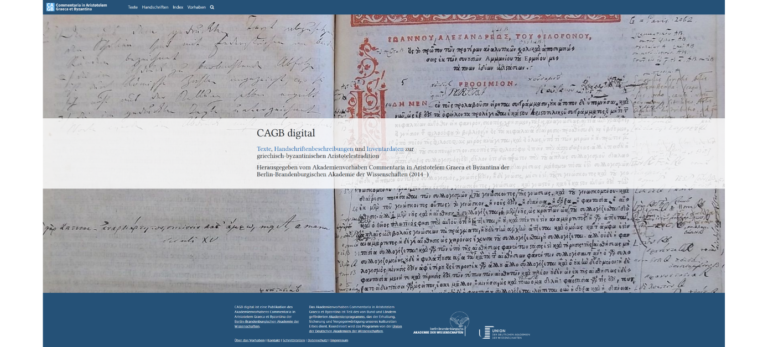
Das Akademienvorhaben hat die philologische Erschließung und kritische Edition antiker und byzantinischer Kommentare, Paraphrasen, Kompendien und Scholien zu den Schriften
Short description of the project
CLARIAH-DE is the merger of the two research infrastructure networks CLARIN-D and DARIAH-DE. As part of the project, the two established research infrastructures were merged over two years (2019-2021).
Project content
CLARIAH-DE was a contribution to the digital research infrastructure for the humanities and related disciplines. By merging the CLARIN-D and DARIAH-DE consortia, CLARIAH-DE has created added value for researchers by further developing existing services along the FAIR principles of findability, accessibility, interoperability and reusability and making them jointly available. The portfolio includes the sustainable provision of research data, technical infrastructures, digital tools and virtual research environments for the humanities, information and training materials as well as handouts on standards and procedures.
The project was divided into six work packages:
AP 1 – Forschungsdaten, Standards und Verfahren
AP 2 – Werkzeuge und virtuelle Forschungsumgebungen
AP 3 – Kompetenzvermittlung und Nachwuchsförderung
AP 4 – Technische Vernetzung und Koordination der technischen Entwicklungen
AP 5 – Community-Engagement: Outreach/Dissemination und Liaison
AP 6 – Organisatorische Infrastruktur/Geschäftsstellen
CLARIAH-DE provides building blocks for a National Research Data Infrastructure (NFDI) and was an important pioneer of the NFDI consortium Text+ for language and text-based research data, which focuses in particular on digital collections and corpora, lexical resources and dictionaries as well as editions. CLARIAH-DE promotes the visibility, collaboration and networking of researchers in an international context and is part of the European Research Consortia (ERIC) CLARIN and DARIAH.
The implementation and development of CLARIAH-DE was ensured by the interlocking of strategic, operational and participatory committees. Together, the committees strike a balance between the technical infrastructure requirements and the research-driven needs of science. Overall coordination is the joint responsibility of the Göttingen State and University Library and the Eberhard Karls University of Tübingen.
The implementation and development of CLARIAH-DE was ensured by the interlocking of strategic, operational and participatory committees. Together, the committees strike a balance between the technical infrastructure requirements and the research-driven needs of science. Overall coordination is the joint responsibility of the Göttingen State and University Library and the Eberhard Karls University of Tübingen.
Twelve institutions are involved in merging the two research infrastructures CLARIN-D and DARIAH-DE in the joint project CLARIAH-DE: Chair of Media Informatics at Otto-Friedrich-University Bamberg, Berlin-Brandenburg Academy of Sciences and Humanities, Institute of Linguistics and Literature at TU Darmstadt, Gesellschaft für wissenschaftliche Datenverarbeitung mbH Göttingen, Göttingen State and University Library, Center for Language Corpora at the University of Hamburg, Institute of Computer Science - Dept. Automatic Language Processing at Leipzig University, Academy of Sciences and Literature Mainz (as subcontractor), Leibniz Institute for the German Language, Department of Computational Linguistics at Eberhard Karls University Tübingen, Herzog August Library (as subcontractor) and Chair of Computational Philology and Modern German Literary History at Julius-Maximilians-Universität Würzburg.
A further 13 institutions are involved in the continued operation of the infrastructures: German Archaeological Institute, Max Planck Institute for the History of Science, Max Weber Foundation - German Humanities Institutes Abroad, Salomon Ludwig Steinheim Institute for German-Jewish History, Forschungszentrum Jülich, Karlsruhe Institute of Technology, Leibniz Institute of European History, Herder Institute for Historical Research on East Central Europe, Bavarian Archive for Language Signals, Chair of English Language and Translation Studies at Saarland University, Institute for Natural Language Processing at the University of Stuttgart, Trier Center for Digital Humanities, and DAASI International GmbH.
Add your DH research project to the project showcase by submitting a short project description via the web form. Enter project data, a brief description, a graphic or visualization as well as a detailed description of the project content with technical assignment, addressees, added value, project managers, funding information and duration.

Das Akademienvorhaben hat die philologische Erschließung und kritische Edition antiker und byzantinischer Kommentare, Paraphrasen, Kompendien und Scholien zu den Schriften
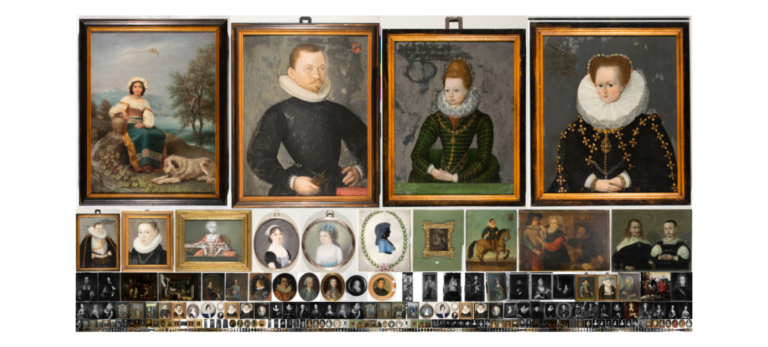
Das vom Bundesministerium für Bildung und Forschung (BMBF) geförderte und am UCLAB der FH Potsdam angesiedelte Projekt Restaging Fashion (11.2020
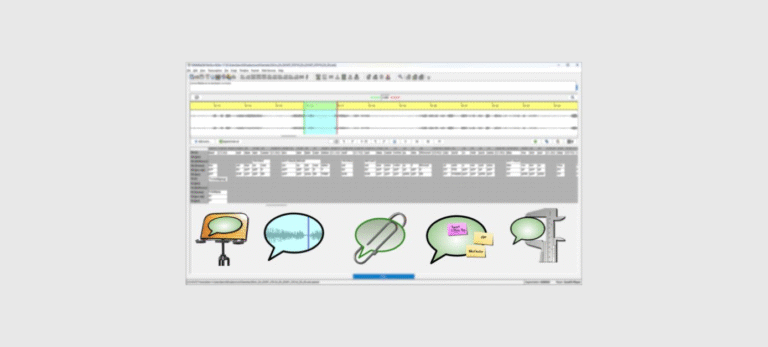
EXMARaLDA wurde ursprünglich (2000-2011) am SFB Mehrsprachigkeit der Universität Hamburg entwickelt. Die Entwicklung von FOLKER und OrthoNormal wurde über das
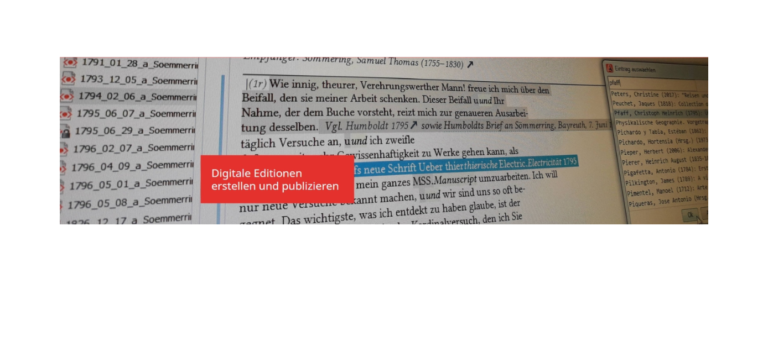
Die digitale Arbeitsumgebung ediarum ist eine aus mehreren Softwarekomponenten bestehende Lösung, die es Wissenschaftler*innen erlaubt, Transkriptionen von Manuskripten und Drucken
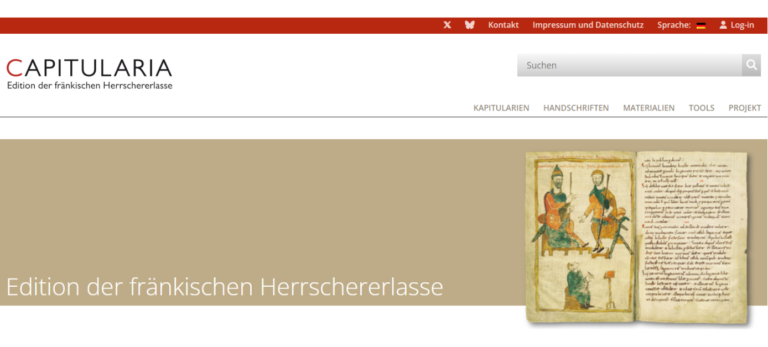
Das Projekt erarbeitet eine Neuedition der fränkischen Herrschererlasse („Kapitularien”), die zu den zentralen Rechtsquellen des europäischen Mittelalters gehören. Zum einen
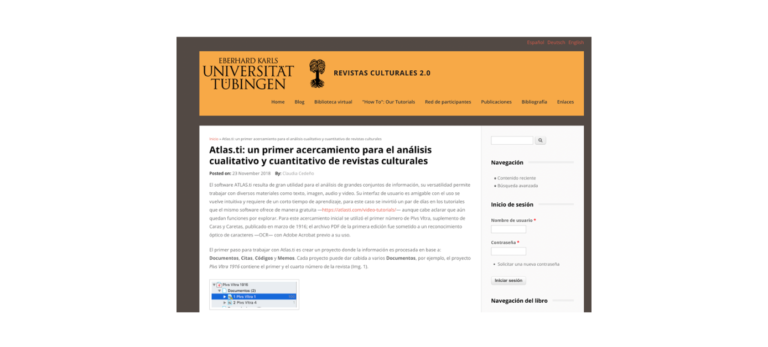
Das Portal Revistas culturales 2.0 dient als virtuelle Forschungsumgebung für alle Interessenten, die sich mit historischen Zeitschriften aus dem spanischsprachigen
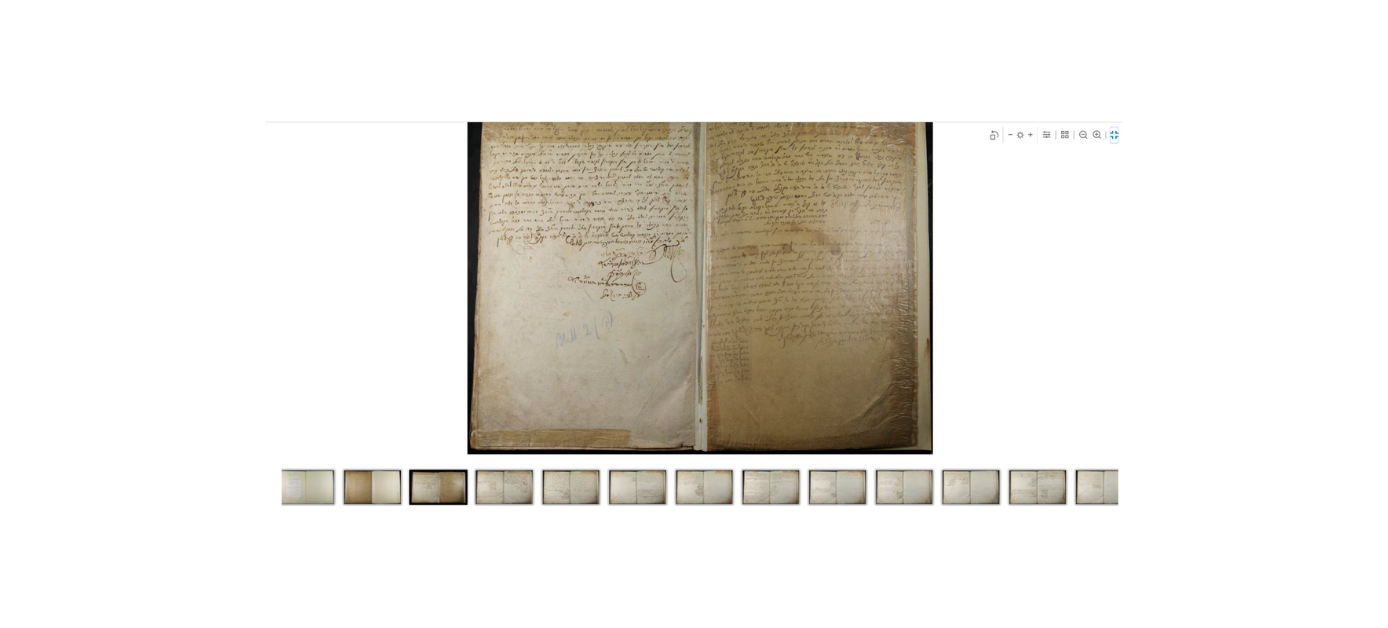
Die im aschkenasischen Europa und Norditalien verbreiteten Pinkasim – Protokollbücher jüdischer Gemeinden – sind zentrale Quellen zur Erforschung der jüdischen Geschichte und Kultur der Frühen Neuzeit. Bisher weit verstreut über Archive und Sammlungen in Israel, Europa und den Vereinigten Staaten, wurden die Gemeindepinkasim im Rahmen des Projekts digitalisiert und in einem Onlinearchiv zugänglich gemacht.
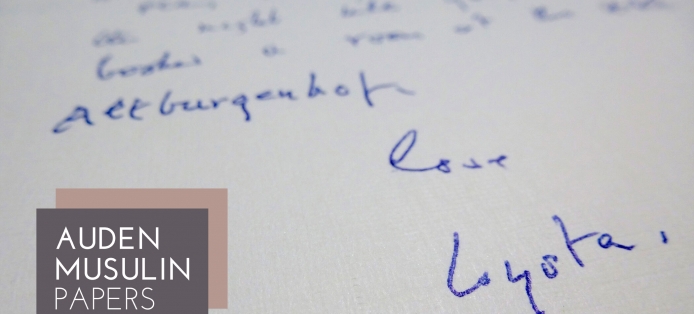
Von 1958 bis 1973 lebte und arbeitete der anglo-amerikanische Dichter Wystan Hugh Auden (1907-1973) viele Monate im Jahr im niederösterreichischen